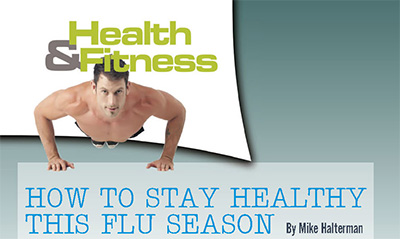
Flu season can start as early as October and go on until April. In Florida, however, peak flu season starts in late January and runs through the end of February, meaning that there are still many weeks ahead where you can, and you just might, fall ill with a nasty sickness. The last time I caught the flu was four years ago, and it can take a lot out of you.
This year in particular, the prevalent strain of flu, 2009 H1N1 (nicknamed “the swine flu”) can be a killer. Younger people, in their 20s and 30s, who are otherwise healthy before coming down with the flu have been hospitalized, and some have died. This is different from a normal flu season, in which the majority of the flu hospitalizations are people over the age of 65. Here are some tips to keep you healthy this flu season:
1) Wash your hands often. This bit of hygienic advice was something your mother taught you  when you were little, but you’d be surprised how many things (and people) we come in contact with over the span of a day. During the winter it is important to be even more vigilant than normal, so wash your hands even more often than you would any other time. Antibacterial soap is best.
when you were little, but you’d be surprised how many things (and people) we come in contact with over the span of a day. During the winter it is important to be even more vigilant than normal, so wash your hands even more often than you would any other time. Antibacterial soap is best.
2) If you’re going to go out, don’t touch your nose, mouth or eyes unless you’ve followed tip #1.
This is the quickest way to get sick. Encounter someone  who’s sick, shake their hand, then absentmindedly rub your eyes. Or shake a sick person’s hand and then have a cigarette (if you are a smoker; that’s bad for you too, you know!). Those are just two examples of how the world around you can get you sick without you even knowing it. When in doubt about whether those person’s hands were clean, or whether you touched a clean surface, WASH YOUR HANDS. You may save yourself a week sick with the flu!
who’s sick, shake their hand, then absentmindedly rub your eyes. Or shake a sick person’s hand and then have a cigarette (if you are a smoker; that’s bad for you too, you know!). Those are just two examples of how the world around you can get you sick without you even knowing it. When in doubt about whether those person’s hands were clean, or whether you touched a clean surface, WASH YOUR HANDS. You may save yourself a week sick with the flu!
3) Get a flu shot! You may be thinking that since it’s February, it is far too late to get a flu shot  for this year. Considering Florida’s flu season can last into April, there are still two months where you can be vulnerable to debilitating sickness. Now if you haven’t gotten the shot, there is still time, but don’t waste any more of it; it takes two weeks for the vaccine to kick in. Then you will be fine for the rest of the season. Luckily, you will be protected against the prevalent “swine flu” strain that’s particularly contagious this year. If you do get the vaccine, ask your health professional if you have an egg allergy, as the most popular vaccine option is manufactured using a virus grown in chicken eggs.
for this year. Considering Florida’s flu season can last into April, there are still two months where you can be vulnerable to debilitating sickness. Now if you haven’t gotten the shot, there is still time, but don’t waste any more of it; it takes two weeks for the vaccine to kick in. Then you will be fine for the rest of the season. Luckily, you will be protected against the prevalent “swine flu” strain that’s particularly contagious this year. If you do get the vaccine, ask your health professional if you have an egg allergy, as the most popular vaccine option is manufactured using a virus grown in chicken eggs.
Now let’s say you didn’t escape the sickness and you are in bed with the flu. What do you do now?
Once you notice flu-like symptoms, take antiviral drugs like Tamiflu. Tamiflu, if taken soon  after the first symptoms arrive, can shorten your time sick. You will have to go to the doctor and get a prescription for Tamiflu, which brings me to my next point: don’t hesitate in seeing the doctor if you feel particularly bad. This flu season is not playing around, especially with young people who may be cavalier about needing to go to the doctor. Go. It could be your life at stake!
after the first symptoms arrive, can shorten your time sick. You will have to go to the doctor and get a prescription for Tamiflu, which brings me to my next point: don’t hesitate in seeing the doctor if you feel particularly bad. This flu season is not playing around, especially with young people who may be cavalier about needing to go to the doctor. Go. It could be your life at stake!
 Finally, while taking over-the-counter medication may not shorten your time with the flu, they will help you feel a little better and help you on your road to recovery. Popular over-the-counter medicines include Contac Cold and Flu Maximum Strength ($9.99 at Walgreens), Sambucol Cold and Flu Relief ($10.99 at Walgreens), Walgreens Brand Cold and Flu Relief Gelcaps ($6.49 for 24), Robitussin Cold and Flu Gelcaps (daytime and nighttime, $6.99 at Walgreens) and Mucinex Fast-Max Multi-Symptom Cold, Flu and Sore Throat ($10.97 in syrup form, $14.47 in caplet form, from Walgreens).
Finally, while taking over-the-counter medication may not shorten your time with the flu, they will help you feel a little better and help you on your road to recovery. Popular over-the-counter medicines include Contac Cold and Flu Maximum Strength ($9.99 at Walgreens), Sambucol Cold and Flu Relief ($10.99 at Walgreens), Walgreens Brand Cold and Flu Relief Gelcaps ($6.49 for 24), Robitussin Cold and Flu Gelcaps (daytime and nighttime, $6.99 at Walgreens) and Mucinex Fast-Max Multi-Symptom Cold, Flu and Sore Throat ($10.97 in syrup form, $14.47 in caplet form, from Walgreens).















